Rio Olympics 2016: Caster Semenya's history-making could spell the end
- Published
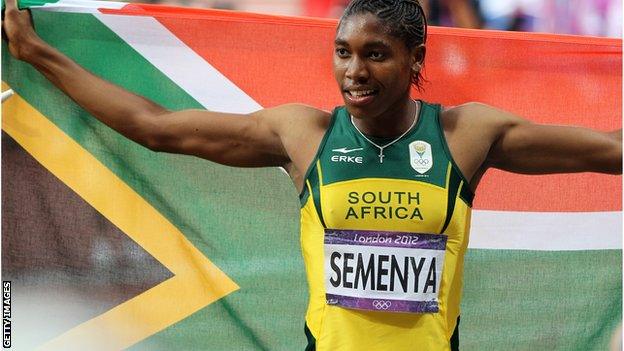
Semenya is an overwhelming favourite for the 800m title in Rio
An athlete denied gold by a doper in 2012, coming back as clearest of favourites to win this time. A runner clocking such fast times, with no suggestion whatsoever of doping herself, that she could smash a questionable world record that has stood for 33 years.
A young woman who was humiliated at her first global championships, coming back to the Olympics as the dominant athlete in her event.
These should all be storylines to cherish. But when Caster Semenya walks into Rio's Olympic Stadium on Wednesday for the heats of the 800m, she will do so into a scientific and ethical storm that could once again sweep her away.
Semenya became the first black South African woman to win a world track title when she stormed to 800m gold in Berlin seven years ago. That was not the reason her story pushed Usain Bolt from the headlines.
An unfair global controversy
The muscular, deep-voiced 18-year-old had caused rumour to swirl when she improved her personal best by seven seconds in less than nine months that year. Then two things happened to turn her from track curio to global controversy: first news broke that athletics' governing body had asked her to undertake gender verification testing,, external then she ran away from her rivals to take gold by the biggest margin in World Championship history.
Whispers became accusations became a horrible mess. "She is a man," said one of the beaten finalists, Italy's Elisa Cusma. Others assumed she was doped.
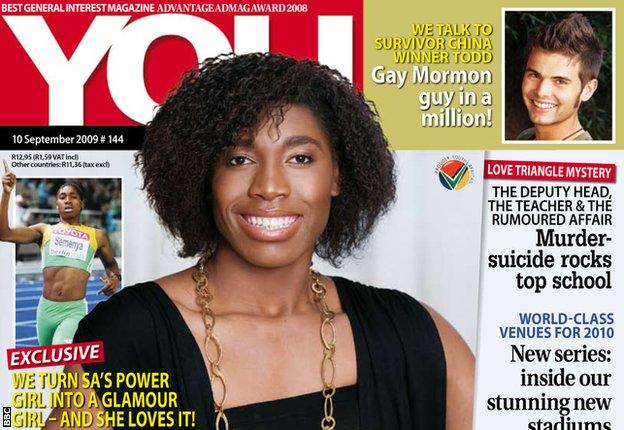
On the cover of South African You magazine, in 2009
She was neither. Semenya, born and raised as a girl, is believed to be intersex, external - identifying as a woman, but with physical characteristics typically associated with both men and women.
No-one knows for certain. In Berlin, on only her second trip outside of her homeland, an innocent abroad overwhelmed by the world's sudden fascination, she said nothing.
She has made no public comment since, and neither have officials, so we are left with what she was diagnosed with - hyperandrogenism, her testosterone levels far in excess of the vast majority of women.
Since testosterone is the principal male sex hormone, promoting among other physical effects muscle mass and strength, the IAAF decided post-Berlin that an intersex athlete with the condition had an unfair advantage over the rest of the competition. , external
And so, four years ago, it established a threshold above which such athletes could not compete in women's events: roughly three times higher levels of testosterone than that naturally occurring in 99% of female athletes.
Allowed to race under one condition
Semenya could race again,, external but only if she took medication that suppressed her levels to under that threshold.
And that is what all assume she did, with mixed results. While she won 800m silver at the 2011 worlds, and silver again at London 2012 behind a Russian, Mariya Savinova, who the World Anti-Doping Agency has recommended be banned for life, her times fell back.
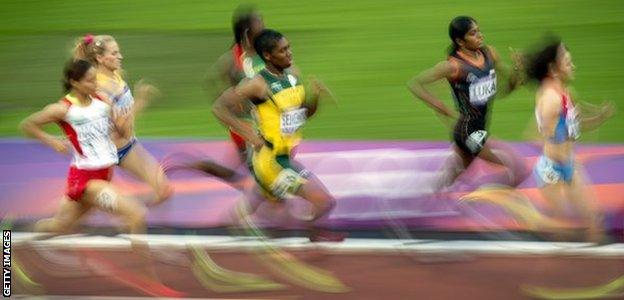
Semenya's times slowed after she was instructed to limit the presence of testosterone levels in her body
That one minute 55.45 seconds she ran in Berlin went untouched. She failed to make the final at last year's Worlds having been unable to run a qualifying time for the Commonwealth Games the summer before, and her story began to fade from public consciousness once again.
Until, that is, another intersex athlete decided to challenge the IAAF's hyperandrogenism regulations.
Dutee Chand is an Indian sprinter who found herself excluded from those same 2014 Commonwealth Games. At the Court of Arbitration for Sport her lawyers successfully argued the IAAF had failed to provide enough evidence that testosterone improved female performance. All regulations were suspended until July 2017.
While the IAAF sets about gathering that evidence, Chand, Semenya and other intersex athletes are free to compete without medication. For Semenya, at least, the effects have been remarkable.
The road to Rio
In April she won the 400m, 800m and 1500m at the South African Olympic trials in the same afternoon, without looking remotely challenged. At the Diamond League in Monaco she ran 1:55.33, the fastest 800m since 2008.
Here in Rio, should she change her usual tactics and run hard from gun to line, Jarmila Kratochvilova's world record of 1:53:28 - the longest standing record in track and field - could easily go.
Caster Semenya: The full interview
Kratochvilova never failed a drug test. But so asterisked is the Czech's 1983 mark, coming from an era of state-sponsored eastern European doping, that its significance is huge.
Semenya winning gold in Rio is one thing. Doing so in a time that most track observers consider impossible for a clean female athlete would threaten to invoke that Berlin maelstrom once again.
Chand argued her exclusion was discriminatory, that she should not be punished for her naturally occurring genetic advantages. Are men with longer limbs not benefiting from a similar edge in basketball, or sprinters with a higher proportion of fast-twitch fibres not at an advantage over other men without the same natural speed?
A matter of genetics
Except elite basketball is not divided into categories for those of different height, or the 100m at these Olympics split along lines of muscle fibre.
At the Olympics you can compete only as a man or a woman. And if 99% of female competitors are significantly disadvantaged against intersex athletes with hyperandrogenism, should they not be protected too?
"You should only be able to win a gold medal in the Olympics if you run great," says highly rated Australian distance-running coach Nic Bideau, "but she can run ordinary and win."
There may be other reasons for Semenya's dramatic improvement this season.
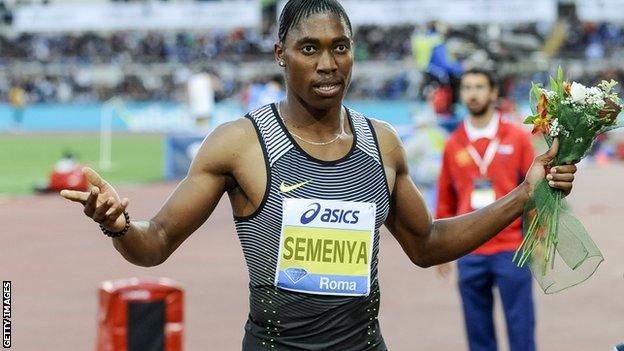
In the Diamond League this year, Semenya ran the 800m in 1:55.33 - the fastest time since 2008
She has not in the past always been entirely focused on training, falling out with her first coach, training with former 800m Olympic champion Maria Mutola before that arrangement too fell apart, struggling with injuries last year.
Four years ago in London she was still fast in taking silver, clocking 1:57.23 as she came storming down the home straight behind Savinova.
Neither is she the only intersex athlete at these Rio Games; she may not even be the only one in the final. Her notoriety is both unwanted and unfair.
But there is a catch-22 which may haunt her all the same: if Semenya runs as well as she can, destroying the field, mangling that old record, it could end her career as it stands at the same time.
For what greater indication of unfair advantage could there be, when the IAAF is trying to buttress its case, than a victory unlike anything history has ever seen before?
- Published18 August 2016

- Published3 August 2016

- Published19 July 2016
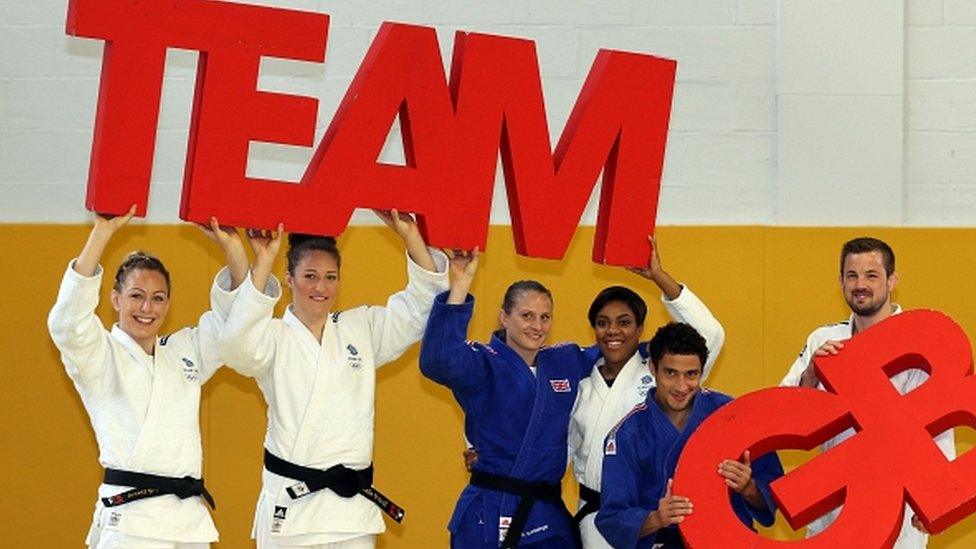
- Published3 August 2016
